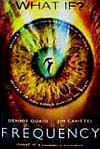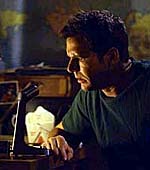Frequency
 for intense violence and disturbing images.
for intense violence and disturbing images.
Reviewed by: Carole Stewart McDonnell
CONTRIBUTOR
| Moral Rating: | Better than Average |
| Moviemaking Quality: |
|
| Primary Audience: | Adults Teens |
| Genre: | Sci-fi Fantasy Thriller |
| Length: | 2 hr. 01 min. |
| Year of Release: | 2000 |
| USA Release: |

| Featuring |
|---|
| Dennis Quaid, Andre Braugher, James Caviezel, Shawn Doyle, Michael Cera |
| Director |
|
Gregory Hoblit |
| Producer |
| Gregory Hoblit, Howard “Hawk” Koch |
| Distributor |
Woulda, Coulda, Shoulda: A review of “Frequency”
It is not often that one feels the urge to applaud the ending of a movie; even rarer to have the entire audience applaud. “Frequency”, Dennis Quaid’s murder mystery about time-bending, is also a cop movie, a movie about family values, and plain old-fashioned entertainment. Those of us who like television programs such as “Seven Days” and “Quantum Leap” or movies like “TimeCop”, know that the time-genre comes down to the simple question of “what if”?

Two stories unfold when the film begins. In the “past”, the Amazing Mets summer of 1969, Frank Sullivan (Dennis Quaid), NYC firefighter is courageously facing a blast. In the present, some 30 years later on the upcoming anniversary of his father’s death, Frank’s son, John (James Caviezel) is leading a troubled grief-stricken life of wouldas, shouldas, couldas. His girlfriend has left him because John’s life is plagued by the question: what if his father had not died way back when? In time, John gets a chance to fix things. (Sun spots, the aurora borealis, and a HAM radio). But in sparing his father’s life, he has inaverdently caused the deaths of seven people—including his mother. It is then up to John and Frank, working together, to not only repair the past, but if possible to make it better.
The movie takes turns exploring the effect of the loss of a father and mother. Mothers and fathers affect sons differently. In the beginning, John’s loss of his father makes him somewhat inneffectual and withdrawn with his loving relationships, though he is loved by his colleagues and friends. When situations are reversed and he loses his mother, he is a useless cop who is a disgrace to the force and unworthy of respect. The audience for this kind of film knows all too well that even the smallest change in the past can produce unforeseen and unwanted life-changing consequences which can be potentially Earth-shattering to our lives and the lives of those we know nothing of. The movie shows us that the worth of each of our deeds can never be fully understood. As John Donne wrote, “no man is an island; everyone is part of the maine.” In short, someone else’s life or death is often (in some way or other) responsible for someone else’s life or death.
The greatest thing about this movie is that it preaches family values without being preachy. We see the effect of a broken family. As Christians, we know that there is just so much we can do to repair the past. When Adam and Eve ate of the forbidden fruit, God “repaired” their mistake by giving them what Milton calls, “a happy guilt.” Their sin caused them to know God’s loving heart because God sent his son to redeem them in their sin. Because of a grievious sin, they were graciously made into adopted sons of God, co-hiers with Jesus Christ. It would be good to think that great errors can lead to great gifts. I have no doubt that some great mistakes lead to wonderful “repairs.” However, for the most part, the past cannot be repaired. And the grief brought on by death and broken families often can only be truly healed by God’s kindness. Still, I like this little fantasy. And the entire audience did as well. Death was not only conquered on the cross 2000 years ago, but once again in the lives of the Sullivans.


